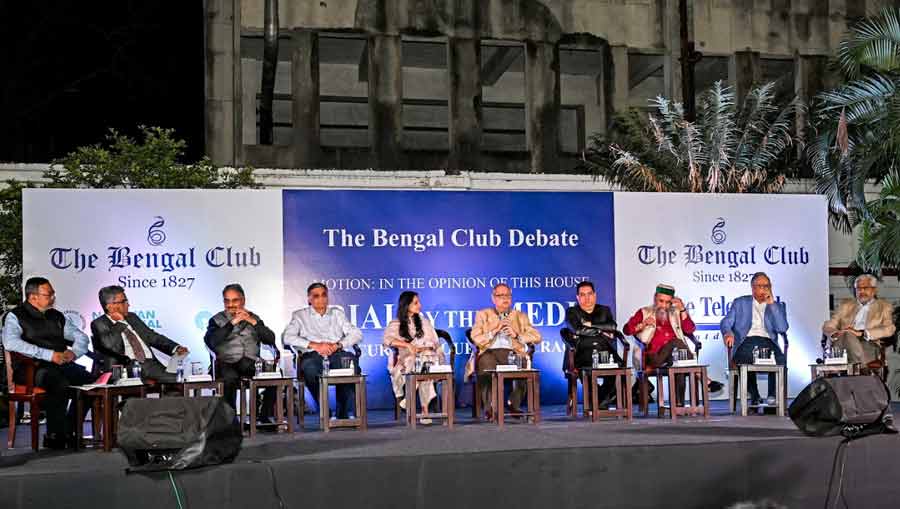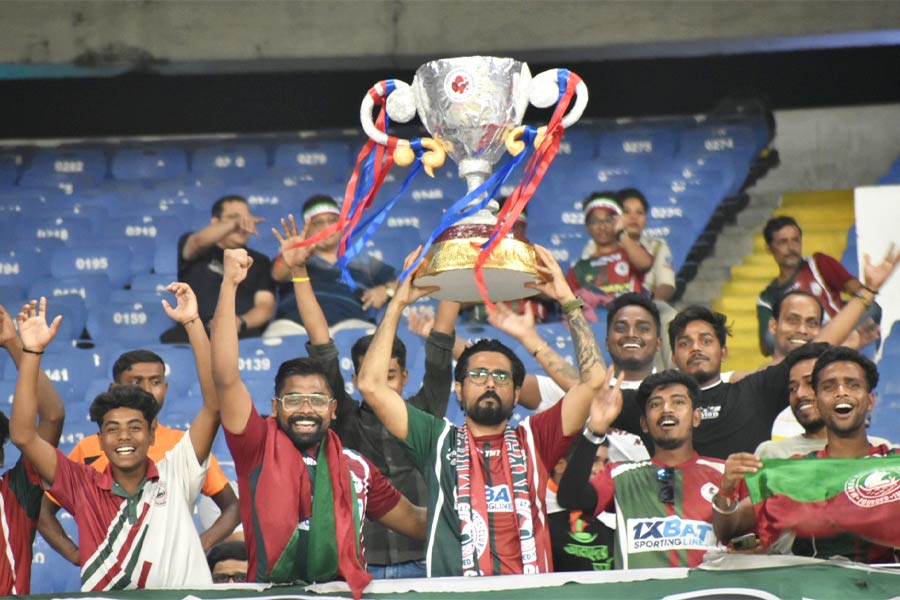It was an evening of coinages at The Bengal Club, which hosted its first debate on February 26, and turned the spotlight on media trials and its effect on democracy. From “the Taj Mahal of democracy” to “terror by media” to the “ABCD” of media trials, it was a heated and engaging war of words.
“Thomas Carlyle said that… of the four pillars of democracy, the press is one, in addition to the executive, the legislative and the judiciary. How much this one pillar will intersect with the other pillar, which is the legislative, will be something I am sure will be debated today,” said Ambarish Dasgupta, president of The Bengal Club, setting the tone for the evening.
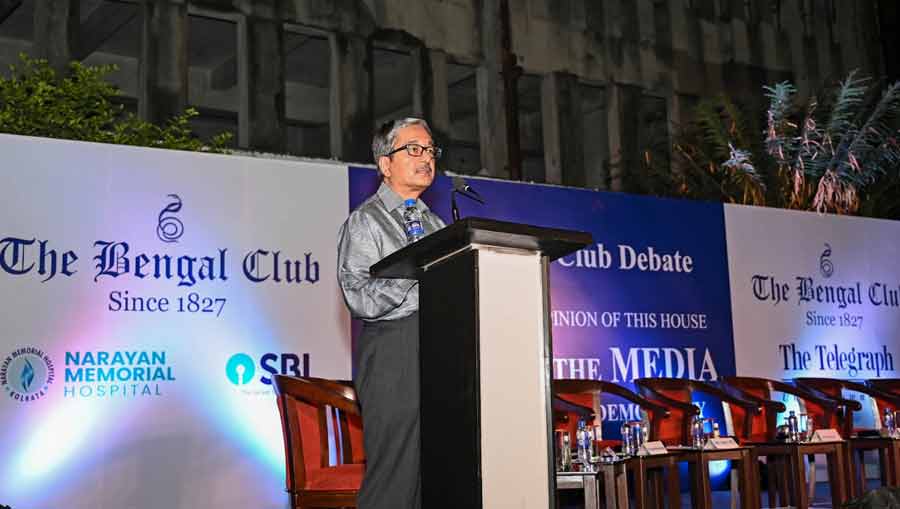
Ambarish Dasgupta, president of The Bengal Club, delivers the welcome address
Amit DattaThe motion for the evening was “In the opinion of this house, trial by the media is a curse of our democracy”. Proposing the motion were veteran journalist and president of the Press Club of Kolkata Snehasis Sur, Calcutta High Court advocate Sabyasachi Chowdhury, retired IPS officer R.K. Johri, and neurosurgeon and chairman of The Bengal Club Library sub-committee Dr Sandip Chatterjee. Opposing the motion were sports journalist and author Boria Majumdar, journalist, writer and documentary-maker Paranjoy Guha Thakurta, founding editor of The Wire Siddharth Varadarajan and Rajya Sabha member Jawhar Sircar.
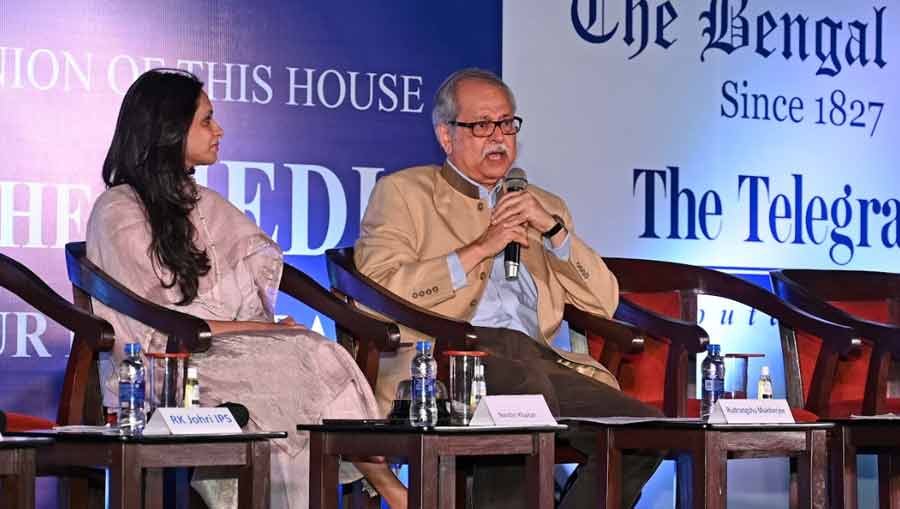
Ashoka University chancellor Rudrangshu Mukherjee, the moderator for the evening, with Nandini Khaitan, the time keeper for the debate
Amit Datta“It was my honour to moderate the first panel discussion at The Bengal Club and it is once again an honour to moderate the first debate at the club, and I hope it becomes a growing tradition of The Bengal Club,” said Rudrangshu Mukherjee, chancellor of Ashoka University and the moderator for the evening, before introducing the speakers and the motion.
‘It takes five seconds to tarnish reputations’
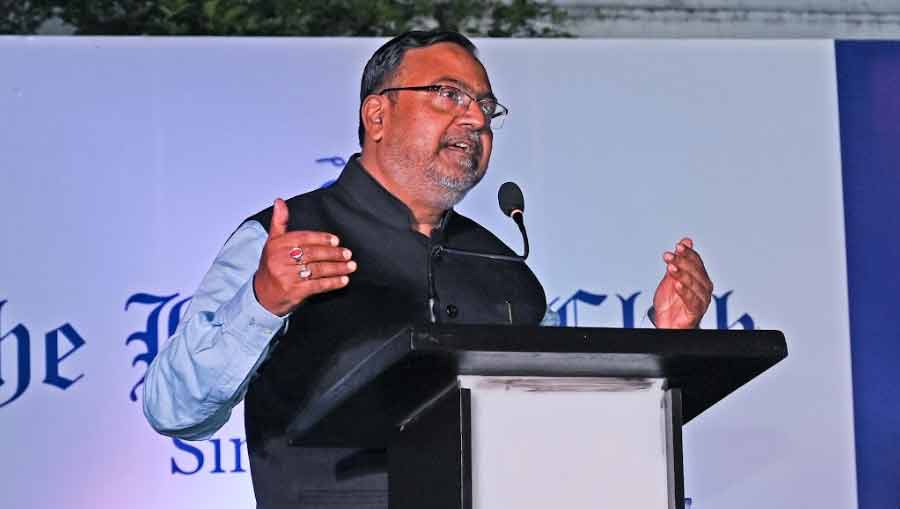
Veteran journalist and president of the Press Club of Kolkata Snehasis Sur proposes the motion
Amit DattaSnehasis Sur opened the argument for the proposition and drew a distinction between investigative journalism and trial by media and welcomed the former as a necessity. “The media is there to unearth the facts that someone wants to hide. That is not a curse to democracy. But the trials undertaken by the media are an overstep,” argued Sur. He also emphasised the fact that trial by media ignores the fact that a person is innocent until proven guilty by a competent court of law and not by anyone with a microphone who can reach millions, and the damage that such trials cause. “Trial by media causes irreparable loss and injury. It takes five seconds to tarnish reputations that have taken lifelong to build,” added Sur.
‘We are not a curse, we are a voice’
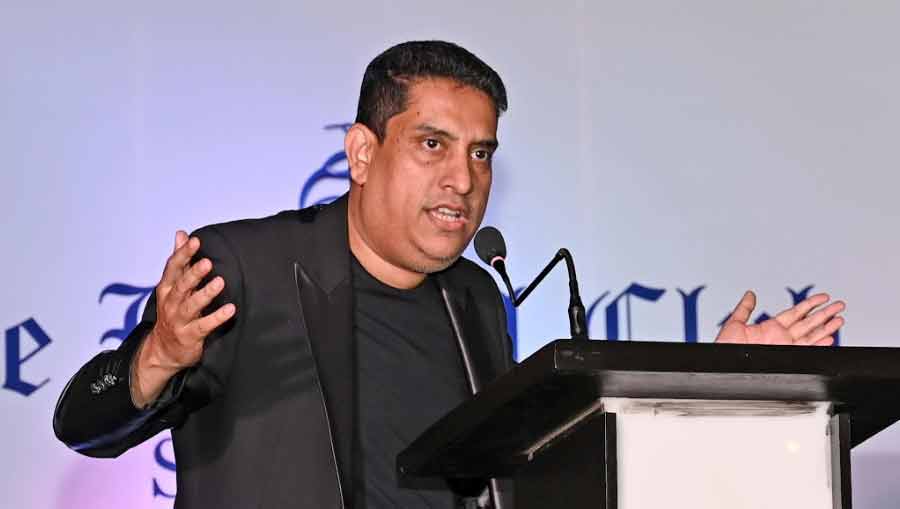
Sports journalist and author Boria Majumdar opposes the motion
Amit DattaBoria Majumdar opened the batting for the opposition and drew the house’s attention to the importance of media as a voice of the people. He gave examples from the field of sports where the media was instrumental in giving a voice to the voiceless – from paralympic gold medal winner Devendra Jhajharia who was promised Rs 30 lakh by the government and the federation in 2004 and ultimately received it only after the media highlighted his case, to Deepa Malik who was bypassed by the federation for the Rio Paralympics till the media came forward and pointed out her case to the courts; she then went on to win a gold medal for India. “We are not a curse, we are a voice. And it is better to understand that there is the good and the bad. There are good politicians and bad politicians, good food and bad food. You can’t paint us all in the same broad brushstroke. We are the voice of dissent. We are the voice, in a democracy, which will raise the voice of the poor, of the underprivileged,” said Majumdar.
‘All of us are, in some form, playing the role of Dhritarashtra and Sanjay’
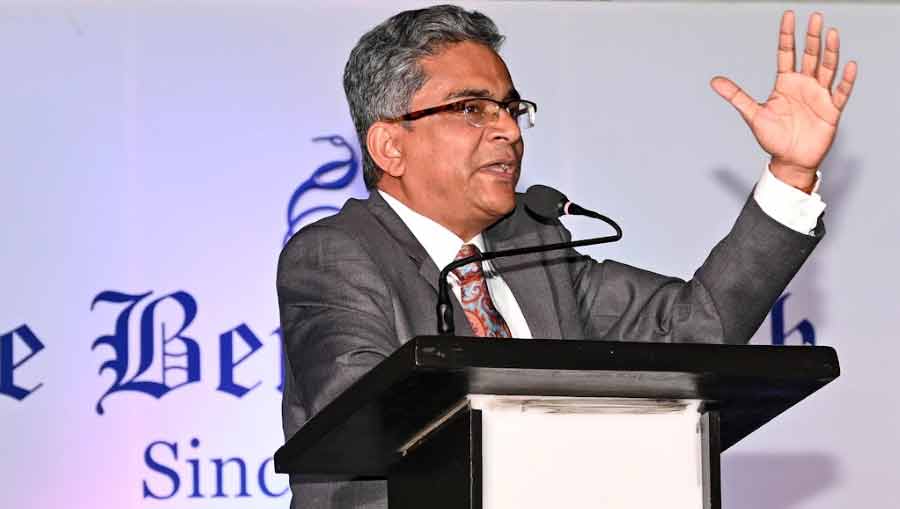
Calcutta High Court advocate Sabyasachi Chowdhury argues for the proposition
Amit DattaSpeaking for the proposition Sabyasachi Chowdhury countered Majumdar saying that it is precisely because the media has a voice that its curse on democracy is all the more important. He drew an analogy of the four pillars of democracy to the four pillars of the Taj Mahal, and how they functioned in upholding “the Taj of democracy”. He likened the media’s role to Sanjay, who narrated the battle of Kurukshetra to a blind Dhritarashtra. “All of us are, in some form, playing the role of Dhritarashtra and Sanjay. All of us are blind in the way that none of us are present at the place where the war or the crime or the event is taking place. We are collecting the information from a Sanjay, who is qualifying it with his or her opinion or view,” said Chowdhury. He drew into focus what he felt were the two fundamental rights that the motion brought into debate – the right to fair trial, recognised by Article 21, and the right to free speech, recognised by Article 19(1)(a). “What happens when there is a collision of the two? The juries are unanimous. If there is a conflict between the right of a fair trial with that of free speech, the former has to be given way because of the wider amplitude of Article 21,” said Chowdhury, calling for checks and balances on the media to make sure that is upheld.
‘It is because of the media… that we can still call ourselves a democracy’
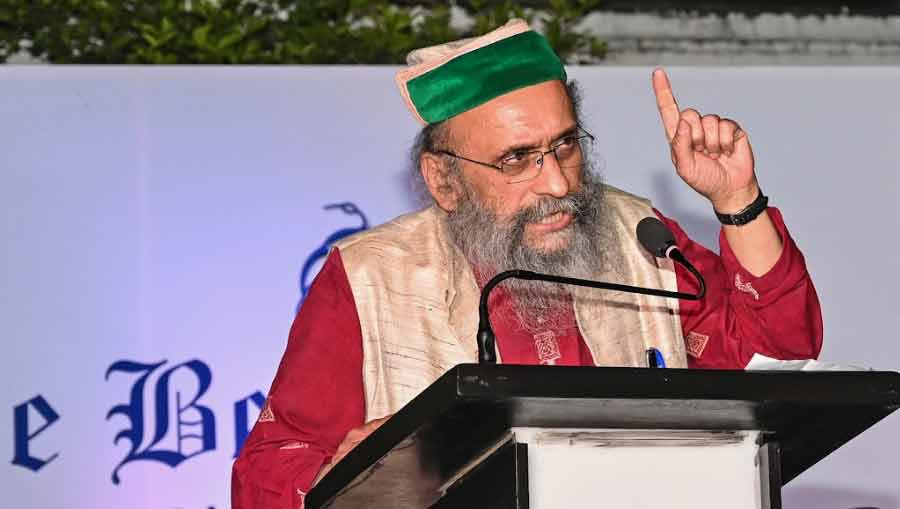
Journalist, writer and documentary-maker Paranjoy Guha Thakurta argues against the motion
Amit DattaThe second speaker opposing the motion was Paranjoy Guha Thakurta, who insisted that it is because of the media that democracy is alive. “It is because the media points out what is wrong with the judiciary and the way it conducts trials and not just the political executive that we can still call ourselves a democracy,” argued Guha Thakurta. He cited examples of cases in which he felt justice wouldn’t have been done if it hadn’t been for the media, from Jessica Lal to Priyadarshini Mattoo, from Nitish Katara to Satyendra Dubey. “Are you aware of how many people are behind bars in this country? It is close to 5 lakh. And 76 percent of them are undertrials. Many poor, underprivileged people are behind bars and have already served the maximum sentence they would have been given, because they don’t have access to the law. It is a cliche to say that justice delayed is justice denied but it is a fact. Who will point it out to you if not the media,” asked Guha Thakurta, who argued that it was the media that was under trial, talking about the journalists who were killed, harassed and had false cases lodged against them.
‘It is time that we have a law to deal with… media terror’
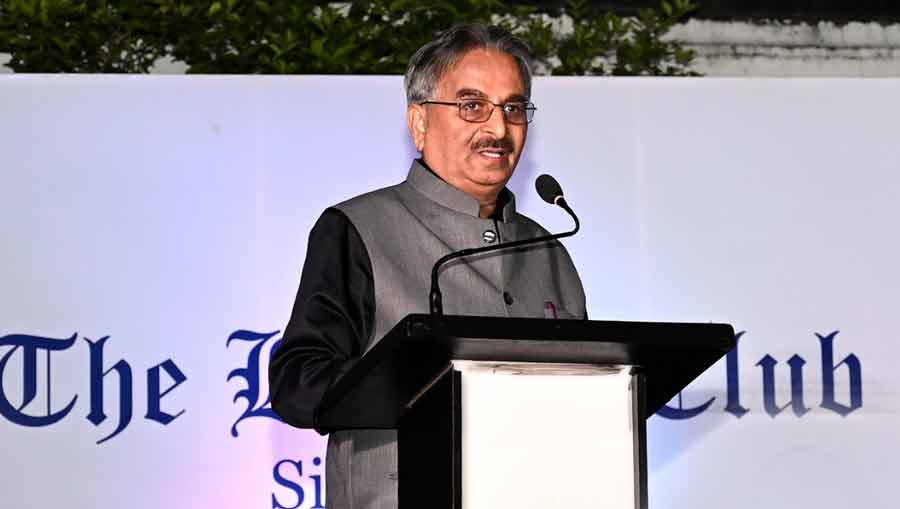
Retired IPS officer R.K. Johri argues for the motion
Amit DattaR.K. Johri built on Chowdhury’s analogy of the four pillars saying that when one pillar starts corroding then the edifice of democracy is seriously in danger. “It is not just a curse, it spells doom for the country and the people of the country,” said Johri. “What does the media do to us? The investigating agencies are demoralised. They defame the entire process, the courts, the executive, the entire enquiry and no second thought is given to taking a side, pronouncing a verdict and playing the role of judge, jury, prosecutor and persecutor.” He argued that trial by media poses an enormous threat to the judicial system because it not only robs a person of free trial, it also sabotages the investigation. “Terrorism is the scourge of society and we have several laws to deal with terrorism. It is time that we have a law to deal with the terrorism that I call media terror. The kind of reporting that is practised shakes our confidence and shakes the edifice of democracy,” said Johri closing his argument.
‘What is the curse that our democracy is confronting today? A Parliament that does not allow debate’
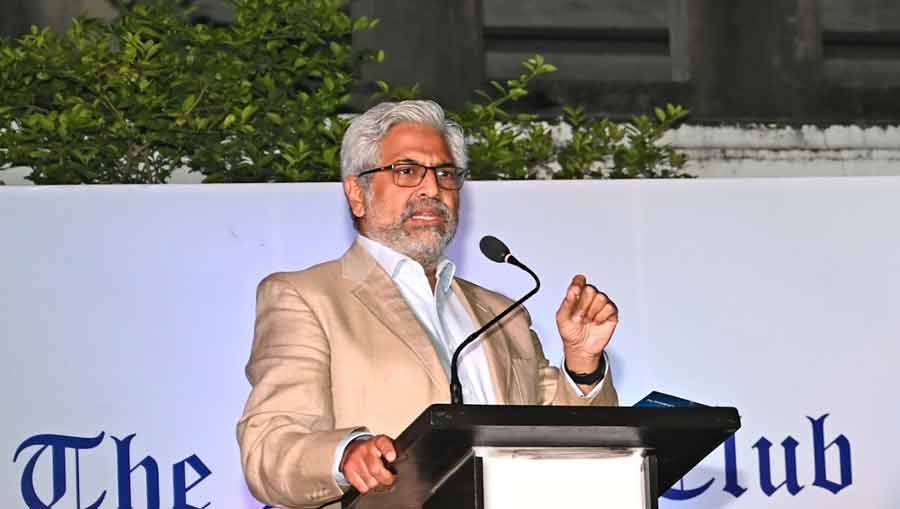
Founding editor of The Wire, Siddharth Varadarajan, opposes the motion
Amit DattaSiddharth Varadarajan began his argument against the motion by saying that the ones who are afraid of the media are those in power, those who want things to remain hidden, those who don’t do the job they have been sworn in by the Constitution to do. “What is the curse that democracy is confronting today? It is a Parliament that does not allow debate, that does not discuss laws adequately before drafting them to such an extent that the chief justice of India was forced to make a statement, that it is the failure of the Parliament to vet laws that has landed India in a situation of endless litigation,” argued Varadarajan, adding to the list “a Prime Minister who has failed to address a single press conference in the seven years he has been in power”, “the deployment of a deadly spyware” Pegasus, the existence of electoral bonds “that have allowed for the non-transparent flow of money into the electoral process”. “Hardly a day passes when colleagues of ours in Jammu and Kashmir are not summoned to the local thana to render accounts to police and the administration about stories that they do not like. That’s a curse to democracy,” said Varadarajan, adding that failure of the judiciary to adjudicate in a timely manner on matters of life and liberty is also a curse to democracy.
‘A for avarice, B for bias, C for our Constitution and D for destruction’
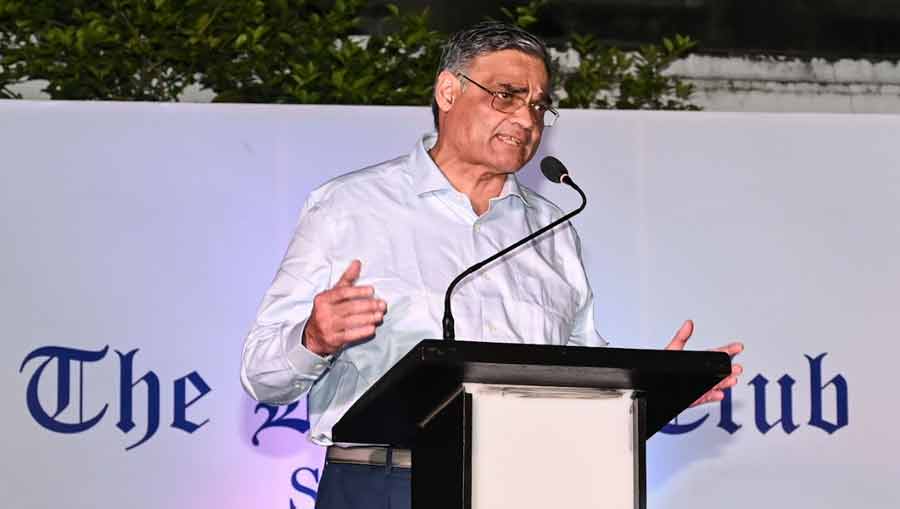
Neurosurgeon and chairman of The Bengal Club Library sub-committee Dr Sandip Chatterjee proposes the motion
Amit DattaThe final speaker from the side of the proposition was Dr Sandip Chatterjee. “We strongly believe that the media is one of the four pillars, with the executive, the legislative and the judiciary, that support the platform on which resides the idol, ideal or idea of democracy. But it is our contention that when one of the pillars, the pillar of the media, lowers its standards by thinking it can pass judgement on everything and everybody, then there is an unevenness of the platform on which democracy is perched and democracy can come to a tantalising slide down to Mother Earth,” said Chatterjee. He based his argument on what he called the “ABCD” of why trial by media is a curse to democracy. “A for avarice, B for bias, C for our Constitution and D for destruction…. A, avarice or greed for money or TRP, B for bias, which may be political bias and in the way you colour public opinion, C, it is against the Constitution, and D for destruction because in minutes you can tell millions of people what they want to believe but is not necessarily true,” elaborated Chatterjee.
‘Trial by media is undertaken when things are being fixed’
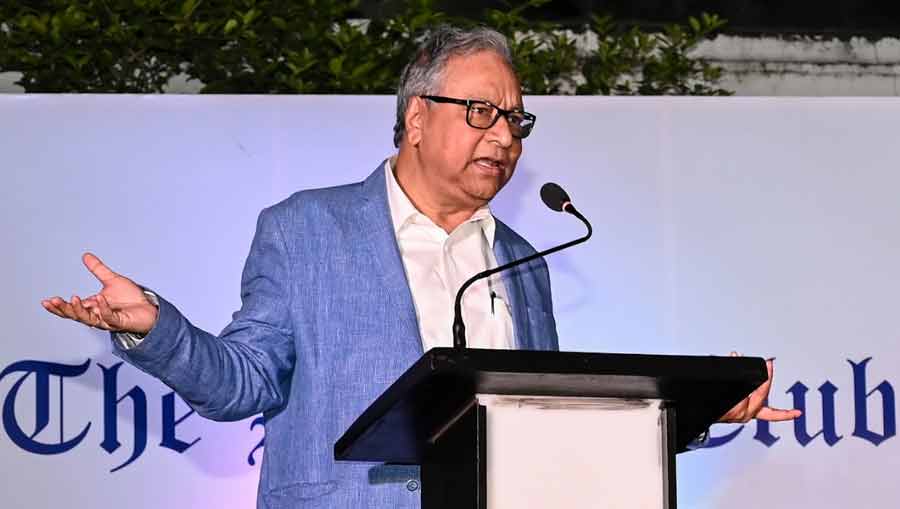
Rajya Sabha MP Jawhar Sircar argues for the opposition
Amit DattaThe last speaker for the opposition was Jawhar Sircar who argued that some of the individual cases used as examples by the proposition to bolster their arguments did not threaten the democracy of India. He did not deny that the media does undertake trials but argued that it only did so when there was a mission citing examples of the Jessica Lal murder, the Nirbhaya case and Rizwanur Rahman where otherwise justice wouldn’t have been meted out. “Yes, the police get demoralised, but people are demoralised even more when nothing happens. So somebody has to shake them out of the stupor and somebody has to make it clear that we will not let things be fixed. Trial by media is undertaken when things are being fixed… because everyone has a price. Even if there is a trial by media, or drama, there is no conviction. And if a judge or a policeman has taken up that occupation then they must face the hazards of the occupation,” argued Sircar, adding that the trials undertaken by the media are to clean up the nation and to serve democracy because it is incumbent on the media to question people and systems that are wrecking the democratic structure of the nation.
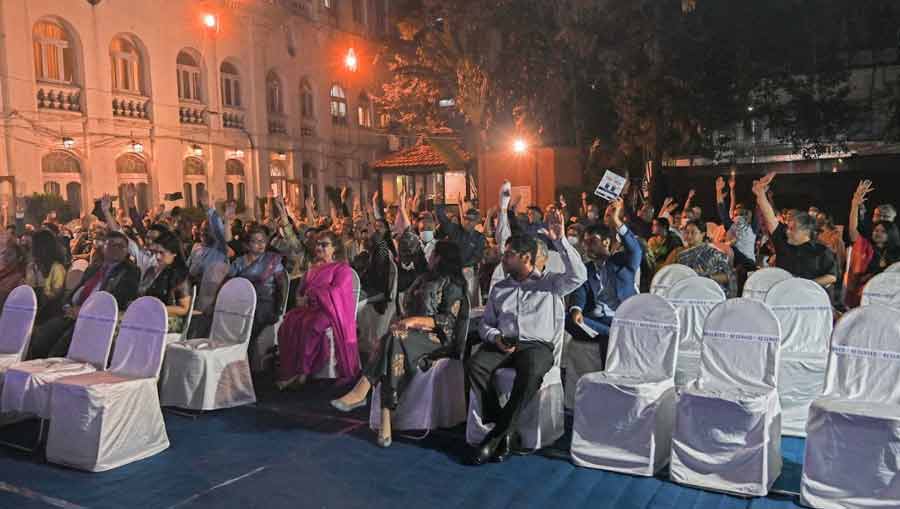
The house votes for the motion in a display of hands
Amit Datta“We have had a fair display of eloquence regarding freedom of fair speech and freedom of fair trial,” summed up Mukherjee, putting the motion to vote. The house voted for the motion.


